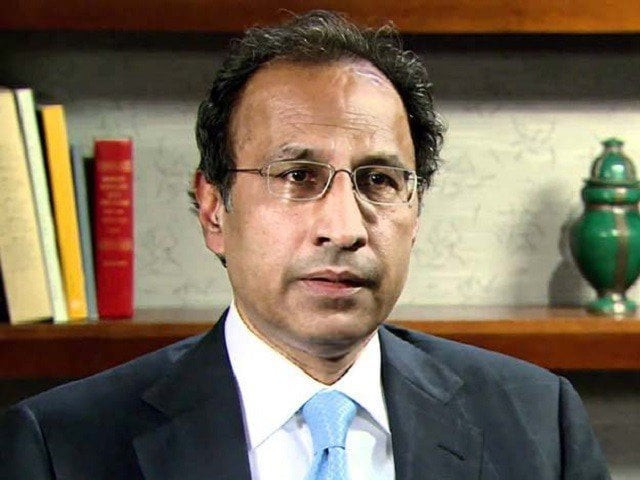Saudi Arabia to give Pakistan $3.2b oil on deferred payments from July
Saudi facility will strengthen Pakistan's balance of payments position, says finance adviser Hafeez Shaikh

PM's adviser on fiance Hafeez Sheikh thanks Saudi crown prince for activating deferred oil payment. PHOTO: EXPRESS/FILE
The announcement was made by Adviser to Prime Minister on Finance Dr Abdul Hafeez Shaikh through his newly created twitter account @a_hafeezshaikh. Shaikh had no twitter account before this but had to create one, as social media remains a favourite communication tool for Pakistan Tahreek-e-Insaf .
https://twitter.com/ahshaikhfinance/status/1131191523914211328
Shaikh's first day score of followers was over 3,000. His predecessor Asad Umar has 5.8 million followers –second highest in Pakistan after Prime Minister Irman Khan's 9.6 million.
"From 1st July 2019 KSA is activating the deferred payment for petroleum products facility of $275 million per month amounting to $3.2 billion per year for 3 years," tweeted Shaikh on Wednesday. "This will strengthen Pakistan's balance of payments position," he said. Hafeez Shaikh thanked the Crown Prince of Saudi Arabia Mohammed bin Salman for his continuous support for the people of Pakistan.
https://twitter.com/ahshaikhfinance/status/1131191521334779905
The two countries inked a financing agreement for the import of petroleum products, crude oil and LNG on February 17 during the Saudi crown prince's Islamabad visit. The oil facility had been announced in November and it was initially expected to become operational from January 1st of this year.
However, due to various procedural and regulatory issues it will take seven months to make the facility operational by July 1, which coincides with the start of new fiscal year.
Riyadh did not want the Oil and Gas Regulatory Authority (OGRA) and the Hydrocarbon Development Institute of Pakistan (HDIP) to be involved in the testing of petroleum products to be imported from the Kingdom under the deferred payment facility, according to a story published in The Express Tribune.
Under the agreement, the Pak-Arab Refinery Company (Parco) and the National Refinery Limited (NRL) would procure crude oil from the Saudi Aramco Product Trading Company. Similarly, the Pakistan State Oil (PSO) and the Pakistan LNG Limited (PLL) would procure petroleum products and LNG from the Saudi company respectively.
The HDIP laboratory tests products at the discharge port prior to unloading. However, while negotiating the terms and conditions of the sales purchase agreement with the PSO, Saudi Aramco insisted that the procurement should be based on the cost, insurance and freight (CFR/CIF)) terms in line with the International Chamber of Commerce's Incoterms 2000. Under these terms, the quality would be determined and finalised at the load port based on the test results of an independent laboratory
Pakistan expects the Saudi facility to help ease pressure on the balance of payments. The UAE had also indicated giving similar oil facility but it subsequently refused to provide oil on deferred payments.
The UAE $3.2 billion oil facility was part of the $6.2 billion that the UAE had announced to give to Pakistan in December to help the country passing through difficult economic times.
The UAE has already transferred $2 billion cash into the coffers of the State Bank of Pakistan (SBP) and another $1 billion are yet to come. The UAE and Saudi Arabian oil credit facilities were part of the $14.5-billion package agreed with three friendly countries, including China.
The government has already announced a staff level agreement with the International Monetary Fund (IMF) for $6 billion bailout package and is currently in process of implementing prior actions like increase in electricity prices, devaluation of rupee and hiking interest rates.
"The government continues to follow a multipronged strategy to ensure continued stability in the country's balance of payment (BOP) position.
"The strategy has included attracting more foreign direct investment, sale of assets and bilateral and multilateral flows," said Finance Ministry spokesperson Dr Khaqan Najeeb.
The central back on Wednesday also announced first ten months balance of payments data that showed an overall improvement in ten months but the monthly current account deficit widened to over $1.2 billion.
"The external sector indicators are pointing to stability, as the current account deficit decreased by 27% to $11.6 billion during July-April of this fiscal year," said Dr Najeeb. He said the imports of goods also decreased by nearly 5% and services of 19% while the workers remittances went up by 8.5%.



















COMMENTS
Comments are moderated and generally will be posted if they are on-topic and not abusive.
For more information, please see our Comments FAQ